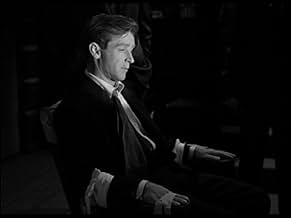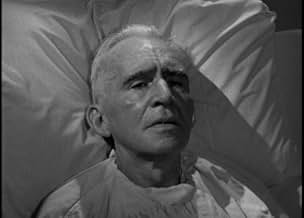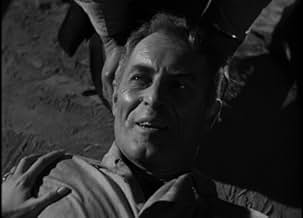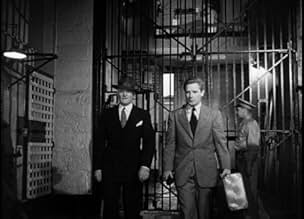CALIFICACIÓN DE IMDb
6.7/10
529
TU CALIFICACIÓN
Agrega una trama en tu idiomaA paroled convict's infatuation with a gold-digger nurse working at a sanitarium leads him to crime.A paroled convict's infatuation with a gold-digger nurse working at a sanitarium leads him to crime.A paroled convict's infatuation with a gold-digger nurse working at a sanitarium leads him to crime.
- Dirección
- Guionistas
- Elenco
Harry Morgan
- Garth
- (as Henry Morgan)
Harry Antrim
- Dr. Stone
- (sin créditos)
Joe Besser
- Cook
- (sin créditos)
Peggie Castle
- Crossroads Tavern Waitress
- (sin créditos)
Stephen Chase
- Bartender
- (sin créditos)
Paul Dubov
- Stick-Up Man
- (sin créditos)
Frank Gerstle
- Stick-Up Man
- (sin créditos)
Anne P. Kramer
- Bertie, the Waitress
- (sin créditos)
Ralph Montgomery
- Bar Customer
- (sin créditos)
Tudor Owen
- Watchman
- (sin créditos)
- Dirección
- Guionistas
- Todo el elenco y el equipo
- Producción, taquilla y más en IMDbPro
Opiniones destacadas
In the Hollywood of late '40s and early '50s, Richard Basehart found plenty of work in the noir cycle but never made a major mark, the mark of a Robert Mitchum or Glenn Ford or even a Dick Powell. His good looks were all-American bland - lackluster - and his acting rarely leapt to dangerous voltages. Probably more at home on stage than on the pitiless screen, he leaves one of his fullest performances in a shunted-aside noir, Outside The Wall.
Just 30 but with 15 years in stir behind him (he'd caused the death of an abusive guard when he was just a kid in reform school), he secures an unexpected release from prison. An old lifer grumbles about life outside: `Everybody's got the jitters. A buck ain't worth a buck anymore.' But mo st of all he warns about the `dames,' of whom Basehart knows absolutely nothing. He'll soon find out.
In his first night in Philadelphia, a B-girl feeds him his first taste of liquor and tries to filch his wallet; later, washing dishes, he foils a stickup and, fed up with Brotherly Love, heads for the clean country of Jewel Lake, landing a job as a lab technician at a TB sanitarium. His first patient (John Hoyt) turns out to be an ex-con he knows who's just pulled a fatal armored-car robbery. When Basehart fails to blow the whistle, the dying Hoyt trusts him enough to mule payoff money to his avaricious wife (Signe Hasso).
The straight-arrow Basehart normally wouldn't dirty his hands, but the blonde and mercenary charms of nurse Marilyn Maxwell lead him to rethink his monkish life (`I just found out what money can buy,' he tells her, forking over a platinum bracelet in his new roadster). Still, his stirring conscience beckons him to fess up about his past to good-gal Dorothy Hart. But Hoyt has the means to hold him to his bargain, while his wife and her ruthless accomplices have their own plans for him....
Crane Wilbur, who started way back in the silent era, wrote several noirs and directed a few of them, mostly about prison life (Canon City, The Story of Molly X). Here, he directs his story with some nicely observed vignettes about the dislocation awaiting released felons but, as it advances, less than persuasive plotting. But, in addition to the convincing work he coaxes from Basehart, he assembles a solid cast, with Maxwell and Hasso rivaling one another in duplicity and Hart more appealing than the saintly simp she might have been.
Harry Morgan also appears, as a thug who elicits information by sliding scalpels under fingernails. Interestingly a veteran of even more noirs than Basehart, Morgan played the heavy the year before, too, in Red Light, but couldn't hold a candle to his partner in crime, Raymond Burr. Here, he takes his place amid a balanced cast with intersecting motives that result in a movie that, while satisfying, falls well short of spectacular. Still, it merits more viewers.
Just 30 but with 15 years in stir behind him (he'd caused the death of an abusive guard when he was just a kid in reform school), he secures an unexpected release from prison. An old lifer grumbles about life outside: `Everybody's got the jitters. A buck ain't worth a buck anymore.' But mo st of all he warns about the `dames,' of whom Basehart knows absolutely nothing. He'll soon find out.
In his first night in Philadelphia, a B-girl feeds him his first taste of liquor and tries to filch his wallet; later, washing dishes, he foils a stickup and, fed up with Brotherly Love, heads for the clean country of Jewel Lake, landing a job as a lab technician at a TB sanitarium. His first patient (John Hoyt) turns out to be an ex-con he knows who's just pulled a fatal armored-car robbery. When Basehart fails to blow the whistle, the dying Hoyt trusts him enough to mule payoff money to his avaricious wife (Signe Hasso).
The straight-arrow Basehart normally wouldn't dirty his hands, but the blonde and mercenary charms of nurse Marilyn Maxwell lead him to rethink his monkish life (`I just found out what money can buy,' he tells her, forking over a platinum bracelet in his new roadster). Still, his stirring conscience beckons him to fess up about his past to good-gal Dorothy Hart. But Hoyt has the means to hold him to his bargain, while his wife and her ruthless accomplices have their own plans for him....
Crane Wilbur, who started way back in the silent era, wrote several noirs and directed a few of them, mostly about prison life (Canon City, The Story of Molly X). Here, he directs his story with some nicely observed vignettes about the dislocation awaiting released felons but, as it advances, less than persuasive plotting. But, in addition to the convincing work he coaxes from Basehart, he assembles a solid cast, with Maxwell and Hasso rivaling one another in duplicity and Hart more appealing than the saintly simp she might have been.
Harry Morgan also appears, as a thug who elicits information by sliding scalpels under fingernails. Interestingly a veteran of even more noirs than Basehart, Morgan played the heavy the year before, too, in Red Light, but couldn't hold a candle to his partner in crime, Raymond Burr. Here, he takes his place amid a balanced cast with intersecting motives that result in a movie that, while satisfying, falls well short of spectacular. Still, it merits more viewers.
10clanciai
Richard Baseheart never competed with such mega stars as Gregory Peck, Humphrey Bogart and John Wayne but kept more to himself concentrating on more complicated roles on a smaller scale, like a kind of understatement actor, but the result is that his roles are always interesting and intriguing. Here he is released from prison after fifteen years at the age of 29 and knows nothing about society. His only schooling in 15 years' imprisonment has been to handle tough guys and ruffians and a thorough knowledge of the criminal type. To get away from the stress and noise of Philadelphia, he heads for the country and finds a small friendly town where nothing ever happens, where he is employed as an assistant at a hospital. So far so good, but it is not. An old fellow gangster turns up in a dying state who has hidden a million away somewhere, and the fellow hoodlums he has fooled are after him, so he is not allowed to die in peace. Unfortunately Richard Baseheart is there, they recognise each other, and the case is cooked. From there on the strain and excitement of the thriller keeps constantly rising like a fever temperature, and a few dames get involved also. This is in many ways the perfect thriller, but Richard Baseheart's acting is what keeps it glowingly alive until it bursts into flames, and the finale is an ingenious climax of the composition.
OUTSIDE THE WALL is a solid B crime movie that delivers everything the genre promises. It might make a nice comparison with TOMORROW IS ANOTHER DAY, released the next year. In both films, an ex-con, newly released, runs into trouble despite their pretty naive aspirations and innocuous personalities.
Probably the main distinguishing characteristic of OUTSIDE THE WALL is the use of Philadelphia locations. It's always fascinating to see a large city back in the middle of the last century. We are usually shown L. A. or N. Y., the Pennsylvania metropolis makes a welcome change.
At the top of the cast list is Richard Basehart. Pretty much an asset in any film, Basehart carries the lead perfectly. His boyish good looks serve the character, a still-young man who never had a chance to experience the world before he was thrown into prison. When he's let out, Basehart meets a stream of women, most of them unworthy of his attentions. Marliyn Maxwell is also well-cast as a brittle, materialistic nurse whom Basehart encounters in his first legitimate job. Her influence leads him to rejoin the criminal life, and plenty of trouble ensues. Among the rest of the cast are Noir favorites, Joseph Pevney, the incredibly prolific John Hoyt and Harry Morgan (who here plays a crime boss with gusto), . Dolores Hart plays Basehart's possible love interest, while Signe Hasso is almost wasted as a money-hungry gangster's wife.
Probably the main distinguishing characteristic of OUTSIDE THE WALL is the use of Philadelphia locations. It's always fascinating to see a large city back in the middle of the last century. We are usually shown L. A. or N. Y., the Pennsylvania metropolis makes a welcome change.
At the top of the cast list is Richard Basehart. Pretty much an asset in any film, Basehart carries the lead perfectly. His boyish good looks serve the character, a still-young man who never had a chance to experience the world before he was thrown into prison. When he's let out, Basehart meets a stream of women, most of them unworthy of his attentions. Marliyn Maxwell is also well-cast as a brittle, materialistic nurse whom Basehart encounters in his first legitimate job. Her influence leads him to rejoin the criminal life, and plenty of trouble ensues. Among the rest of the cast are Noir favorites, Joseph Pevney, the incredibly prolific John Hoyt and Harry Morgan (who here plays a crime boss with gusto), . Dolores Hart plays Basehart's possible love interest, while Signe Hasso is almost wasted as a money-hungry gangster's wife.
From acne ridden adolescent, to hardened thirty year old, Richard Basehart has known only reform school and prison. He is a world leader on the workings of the criminal mind and on survival in the most iniquitous of company. He is also an abject novice on coping with an ever changing modern society, characterized by high rise buildings, fast cars, noisy, bustling city streets and rapidly advancing automation. Utterly naive about girls and alcohol. RESULT: Overpowering two armed robbers? - Piece of cake. Crossing the road?.......Nightmare!
Despite brittle, awkward social skills, Basehart puts his best foot forward, landing a steady, responsible job at a sanatorium and with some cheery colleagues there is genuine cause for optimism, until he falls foul of feeble, fast fading felon, John Hoyt, wheeled in as a patient. Suddenly, Basehart is teetering on the brink. Facing a dilemma. The lure of big, but dirty money and with a high maintenance girlfriend in tow, will the temptation prove too great?
On one level, this is just a neat little crime flick, about a man who has served his time, is eager to go straight, but finds himself compromised as much by the corruption of the outside world, as by demons from his past.
Alternatively it stands as a stark polemic on a woefully inadequate, not fit for purpose system, failing miserably to support ex-criminals as they desperately seek to adjust and find fulfillment in life, outside the wall.
Despite brittle, awkward social skills, Basehart puts his best foot forward, landing a steady, responsible job at a sanatorium and with some cheery colleagues there is genuine cause for optimism, until he falls foul of feeble, fast fading felon, John Hoyt, wheeled in as a patient. Suddenly, Basehart is teetering on the brink. Facing a dilemma. The lure of big, but dirty money and with a high maintenance girlfriend in tow, will the temptation prove too great?
On one level, this is just a neat little crime flick, about a man who has served his time, is eager to go straight, but finds himself compromised as much by the corruption of the outside world, as by demons from his past.
Alternatively it stands as a stark polemic on a woefully inadequate, not fit for purpose system, failing miserably to support ex-criminals as they desperately seek to adjust and find fulfillment in life, outside the wall.
Richard Basehart went into Cherry Hill Prison when he was 14. Now he's 29, and has just been pardoned. The world has grown noisy and strange, but he just wants to keep his head down, so he winds up in a small town working for almost nothing at a hospital that specializes in lungers. He vaguely hopes to get a girl friend, but doesn't know anything about women, so when nurse Marilyn Maxwell turns him down because she's looking for a rich man, he agrees to help armored-car robber Joseph Pevney get some money to his ex-wife in return for a bankroll. He impresses Miss Maxwell with the money, but the wife's mob wants all of the money from the robbery.
I'm so used to Basehart playing deep-voiced authority figures in the 1960s, that watching him play this young-old fish out of water is startling. Crane Wilbur directs his actors to very simple performances that lead you to think that this is all inevitable, while getting in a subtextual knock at society's unwillingness to accept ex-cons. With Signe Hasso, Dorothy Hart, Lloyd Gough and Harry Morgan.
I'm so used to Basehart playing deep-voiced authority figures in the 1960s, that watching him play this young-old fish out of water is startling. Crane Wilbur directs his actors to very simple performances that lead you to think that this is all inevitable, while getting in a subtextual knock at society's unwillingness to accept ex-cons. With Signe Hasso, Dorothy Hart, Lloyd Gough and Harry Morgan.
¿Sabías que…?
- TriviaJoe Besser appears uncredited as a the diner owner who is held up at gun point early in the film. He later gained fame as a member of the Three Stooges briefly from 1957-59.
- ErroresAt the end of the film when dying criminal Jack Bernard (played by John Hoyt) falsely and vindictively attempts to incriminate Larry Nelson (Richard Basehart) to the police as being his former accomplice in the armoured car robbery, all Larry would have had to do in order to clear himself would be to have his true identity verified by the authorities of the Philadelphia prison from which he had recently been released.
- Citas
Charlotte Maynard: You've got hands like iron. A girl wouldn't have much chance if you really got sore.
Selecciones populares
Inicia sesión para calificar y agrega a la lista de videos para obtener recomendaciones personalizadas
- How long is Outside the Wall?Con tecnología de Alexa
Detalles
- Fecha de lanzamiento
- País de origen
- Idioma
- También se conoce como
- Outside the Wall
- Locaciones de filmación
- Eastern State Penitentiary - 2124 Fairmont Avenue, Filadelfia, Pensilvania, Estados Unidos(early exterior and interior scenes)
- Productora
- Ver más créditos de la compañía en IMDbPro
- Tiempo de ejecución1 hora 20 minutos
- Color
- Relación de aspecto
- 1.37 : 1
Contribuir a esta página
Sugiere una edición o agrega el contenido que falta

Principales brechas de datos
By what name was Yo fui presidiario (1950) officially released in India in English?
Responda



































